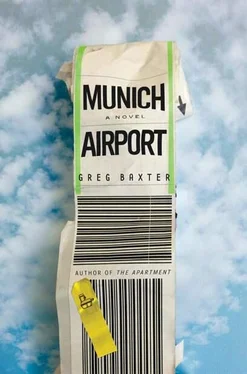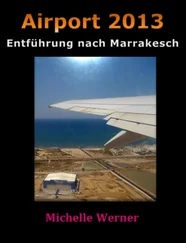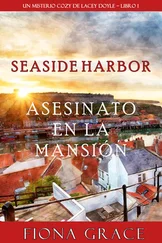On our second morning in the new apartment, my father woke me to say he had a surprise. He had been up a few hours, but I hadn’t heard a thing. He said, I’ve got a surprise, get dressed, get some clothes for a couple of days, pack them in a bag. So I got dressed. I packed up everything I’d brought to Berlin. I ate some breakfast, then we went downstairs and walked around the corner, and my father pulled a key from his pocket, pressed a button, and the car we were standing beside — a big, black, sleek Toyota Camry — unlocked, and the lights flashed.
Hey hey, I said.
Hey hey , he said.
He threw me the key and said, You drive.
We’re going now?
Why not?
Well, how do we get out of Berlin?
I got a GPS, he said.
But I’m still drunk from last night.
We’re fully insured, he said, crash as often as you like.
But we just got the new apartment.
It’ll be here when we get back.
We sat inside. The seats were soft. It had automatic transmission. The steering wheel was thick and soft. There was great leg space. It had cruise control. The dash beamed bright white and red. I pushed my seat back, lowered it, reclined it a bit — all electric — adjusted the mirrors, and turned on the radio. The car was very smooth. Once we got on the autobahn, it pulled a hundred and seventy kilometers an hour without any trouble, without much sound. It just flew, and you barely felt the road. Yes, every once in a while, an S-Class went by us, reminding everybody on the road who the king was, but for the most part we zoomed by everybody without being overly conscious of our speed. We stopped at gas stations for snacks, cheeseburgers, slices of pizza, buns, and so my father could stretch his legs. Our journey took us through the Rhineland, then through the Ardennes, then to Brussels. After Brussels, we went to Aachen. The only part of the trip my father let me know about beforehand was Aachen — because on that first stretch my father talked a lot about Charlemagne. Our trip lasted five days. Five days of warmth and sunshine. But then winter returned, and we arrived back in Berlin in a sleet storm, in a fog that swirled as cars drove through it, in the middle of the night, stinking of all that time in a hot car together, and stinking of the long day’s journey.
I’d never experienced anything quite like the traffic in Brussels. It seems to be a city absolutely strangled by stupid, overcrowded intersections. And I think our visit coincided with a couple of days of strikes or protests. Every driver there was deranged and homicidal. We waited at a roundabout for thirty minutes, then again, then again, and finally inched along the motorway for an hour before we got to something resembling normal heavy traffic, with low visibility, rain, and fog. When we arrived in Aachen, I was in desperate need of a shower. I had sweated through my shirt and pullover. My pants were uncomfortably sticky. But we thought we had to hurry. We thought we had five minutes. We hurried from our parking spot to the cathedral. And then, to our embarrassment, we couldn’t locate the entrance for a few minutes, until we realized that it was obvious. The entrance was in the West Front, like, said the brochure, a great bulwark intended to protect God’s house against the outer darkness, at the foot of the tower, leading to the central core. Then through to the Octagon, under the magnificent and low-hanging chandelier, Barbarossa’s chandelier, which was built three centuries after Charlemagne’s death. My father sat in a pew under the chandelier to catch his breath. The interior was dark, and in my memory it was green. There was candlelight. Charlemagne’s shrine was way past the altar, behind rope. I said, Is that it? That’s it, he said. It was golden and unexpectedly small. The shrine was elevated, and it rested inside a very modest beam of light that didn’t seem to come from anywhere, so that it gleamed in the same way Christ is gleaming in Piero’s Flagellation . I felt the need to have my father stand beside it. To look into the color and ornament of the tomb that contained Charlemagne’s bones. But he was in no mood to stand and walk around. Every few seconds, he coughed. The coughing caused him intense pain that made him double over. Saliva hung from his lips. His hands were trembling. He wiped his mouth and sat up and looked at me. His eyes were blank. His skin was green. He seemed emaciated. Then he started coughing again, and leaned forward, into his own lap. I knew it was the hurrying that had exhausted him, but another part of me wondered if the place itself did not contain a force capable of destroying him, cell by cell, breaking him apart, scattering him in the air. There were three small groups in the room with us. Each group was guided by its own amateur know-it-all, one of those experts on a thousand unimportant things. The people following these know-it-alls seemed variously intrigued or bored to death. I went around looking at a few things on the walls, waiting for my father to stop coughing. A few minutes later, a new group entered the room, this time led by a younger man — obviously a member of staff. He spoke about the chandelier for a while, with practiced stresses, pauses, and gestures, then the statue of Mary, then about the mosaics of the dome. I followed them at a distance. I didn’t understand what he was saying, but he was pointing out important things, so that when I went to the souvenir shop and bought a book in English, I would know which parts were worthy of attention. When the new group was led behind the rope to Charlemagne’s shrine, I asked if my father and I could come along. He said it was a private tour, and anyway it was in German. I said we had come a long, long way, and we didn’t need to hear him speak, we only needed to get behind the rope, my father was a historian and knew quite a lot about Charlemagne. The man peered over at my father, who was still sitting, but the coughing had subsided. I’m sorry, said the man, but if you want to view the shrine, you will have to return next week. I told him my father’s name, not because I thought the man would recognize it, but because I thought saying his name would make the man think he ought to recognize it. The man politely admitted the name meant nothing to him. He looked at his watch. The people on the tour glared at me nastily, so I begged their pardon and returned to my father. No luck, I said. Hmm, he said. He stood and walked to the altar, turned around and looked up, to the upper level, where Charlemagne’s throne sat, from which he would have observed services. Opposite the throne, at eye level with the throne, was Christ on the cross, staring back at Charlemagne, like a man and his wife. The private tour ended, and the other groups left, and we were alone. I cannot say now why we didn’t simply step over the rope. It was just a little bit of low rope. It was just, I think, a suggestion to stay back.
The drive back to Berlin from Aachen was long, foggy, and, finally, frozen. The motorway interchanges around Aachen, Cologne, Bonn, Düsseldorf, Essen, Dortmund — everywhere you turn, you find a medium-sized city — were too convoluted for our GPS — it kept telling us, for instance, to exit the motorway right, so we would exit, but we had taken the wrong exit, not far enough right, the exit we wanted was two hundred yards back — so we spent what seemed like hours doing circles. You’re driving too fast, said my father, that’s why the GPS can’t keep up. If we go any slower we’ll get hit from behind, I said. About halfway to Berlin, without any explanation, our GPS went blank, and nothing we did could get it working again. After that we made a few daring diversions to avoid traffic jams — through fog, racing to stay with big trucks that seemed to be headed in the direction of Berlin. We’d see traffic gathering, or hear the word Stau on the radio, which is the German word for traffic jam, and then a truck or two would exit, and I’d say, Those trucks know something! And my father would say, Follow them! Around midnight or one, within a hundred kilometers of Berlin, all the traffic on the road seemed to vanish. You couldn’t see the lines on the road. You hoped that all the cars ahead of you were running rear fog lights, or else you might not see them until you crashed into them. It was quite scary. It was so scary, in fact, that after all the arguing and complaining my father had done until that point, he became utterly silent and still. The fog and foul weather were so bad we couldn’t see the big blue motorway signs right above us, and we made a few more wrong turns, which meant we had to exit and find a turnaround, which wasn’t always straightforward. These diversions took us down below the motorways, into woods and nearly impenetrable fog, fog that slowed us to a crawl, trying to find the entrance back onto the motorway. We always did. My father kept quiet. Finally we saw a little statue of a bear, the Berlin bear, and then it was just a matter of driving toward the center until we reached a part of town I recognized. We got back to the apartment around two and went straight to bed. All night I slept fitfully and with horrible dreams, suffering sweats and chills, until it was light, and then I got up and closed the curtains — though I still could see a crack of light around the curtains, so I put on my sunglasses, and then I went back to sleep, and I slept dreamlessly, like a drugged sleep — the kind of sleep you cannot move your legs after. It was one in the afternoon when I checked the time. I massaged my thighs. I pointed my toes. My back was stiff. My neck was sore. I drank the pint of water I had remembered to pour myself on the way to bed. I got up, made some coffee, opened up my laptop and started to delete e-mails. The only two e-mails I read were from the aerospace firm. The first was from the director. In it, she expressed her sadness over my loss, and reiterated the offer to take some time. The other e-mail was from Chris, with condolences again, but also with some details about working remotely. She looked forward to getting started whenever I was ready. I must have gained fifteen pounds over the five days we’d been on the road, but it wasn’t remarkable in my face, because my beard had filled out. I had changed my appearance. I now wore that black suit jacket everywhere, and it was getting dirtier and more wrinkled by the day, and I wore my shirts unbuttoned quite low — like I’d forgotten what I was doing in the middle of buttoning up my shirt. I think I was trying to look like an old rock star who had come to Germany to recuperate following a nervous breakdown, or to die, or whatever the opposite of a moderately successful marketing consultant was.
Читать дальше











